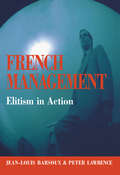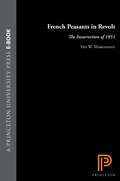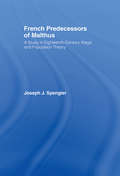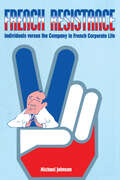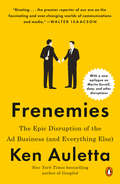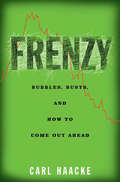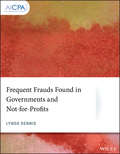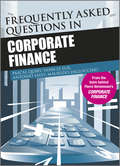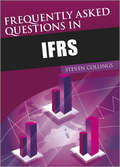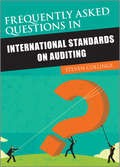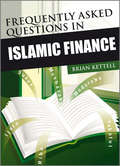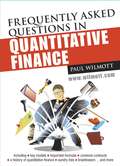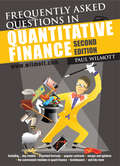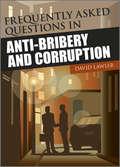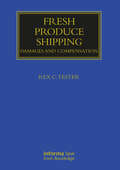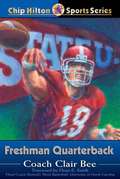- Table View
- List View
French Made Simple
by E. Jackson A. RubioThis is as complete beginner's course in French which covers the requirements of the various GCSE examination syllabuses, and provides a good background to the language for students on RSA and other similar courses. The approach is designed to be of particular value for further education and self-study purposes.
French Management: Elitism in Action
by Peter Lawrence Jean-Louis BarsouxThis fascinating book is an account of management in the contemporary French business world. The formal nature of work relations and the rituals of French business life are analyzed and set against the role of senior executives, and the book looks at the corporate culture of four leading, but very different companies * Michelin* L'Air Liquide* L'Oreal* Carrefour. Also included is an examination of general management attitudes to labour relations, and the book includes an overview of the distinctive features of French management, future trends, and the changes that further European integration may or may not bring.
French Peasants in Revolt: The Insurrection of 1851
by Ted W. MargadantThe triumphant rise of Louis Napoleon Bonaparte over his Republican opponents has been the central theme of most narrative accounts of mid-nineteenth-century France, while resistance to the coup d'état generally has been neglected. By placing the insurrection of December 1851 in a broad perspective of socioeconomic and political development, Ted Margadant displays its full significance as a turning point in modern French history. He argues that, as the first expression of a new form of political participation on the part of the peasants, resistance to the coup was of greater importance than previously supposed. Furthermore, it provides and appropriate testing ground for more general theories of peasant movements and popular revolts.Using manuscript materials in French national and departmental archives that cover all the major areas of revolt, the author examines the insurrection in depth on a national scale. After a brief discussion of the main characteristics of the insurrection, he analyzes its economic and social foundations; the dialectic of repression and conspiracy that fostered the political crisis; and the armed mobilizations, violence, and massive arrests that exploded as the result. A final chapter considers the implications of the insurrection for larger issues in the social and political history of modern France.
French Philosophy and Social Theory
by Jacob Dahl RendtorffThis book demonstrates how the conceptual resources of contemporary French philosophy from the early 20thCentury to the present day can be applied to give us new perspectives on business ethics and the ethics of organizations. In providing an overview of possible applications, the book covers a wide range of philosophers, philosophical movements and perspectives and provides detailed analyses of core materials relevant to business ethics. It explores and analyzes French philosophy, taking into account phenomenology, existentialism, French epistemology, structuralism, post-structuralism, deconstruction and postmodernism as well as recent discussions of philosophy of organizations and management. Each chapter contains suggestions for further reading and educational illustrations of possible applications to the mainstream business ethics and ethics of organization literature.
French Predecessors of Malthus
by Joseph J. SpenglerFirst Published in 1966. Routledge is an imprint of Taylor & Francis, an informa company.
French Resistance: Individuals Versus the Company in French Corporate Life
by Michael JohnsonThis study examines France's determination to remain aloof and unaffected as the world economy threatens the French way of doing business. Describing the difficulty in initiating change in French organizations, the author tells of the obstacles he encountered in attempting to modernize the working practices of a Paris firm. His observations are based upon customs and habits peculiar to the French, yet they apply equally to all foreign cultures. Management methods, attitudes to the outside world, and the historic roots of the French mentality are viewed and explained anecdotally, based on the author's experience of living and working in France, and are accompanied by humorous illustrations.
Frenemies: The Epic Disruption of the Ad Business (and Everything Else)
by Ken AulettaAn intimate and profound reckoning with the changes buffeting the $2 trillion global advertising and marketing business from the perspective of its most powerful players, by the bestselling author of GoogledAdvertising and marketing touches on every corner of our lives, and is the invisible fuel powering almost all media. Complain about it though we might, without it the world would be a darker place. And of all the industries wracked by change in the digital age, few have been turned on its head as dramatically as this one has. We are a long way from the days of Don Draper; as Mad Men is turned into Math Men (and women--though too few), as an instinctual art is transformed into a science, the old lions and their kingdoms are feeling real fear, however bravely they might roar. Frenemies is Ken Auletta's reckoning with an industry under existential assault. He enters the rooms of the ad world's most important players, some of them business partners, some adversaries, many "frenemies," a term whose ubiquitous use in this industry reveals the level of anxiety, as former allies become competitors, and accusations of kickbacks and corruption swirl. We meet the old guard, including Sir Martin Sorrell, the legendary head of WPP, the world's largest ad agency holding company; while others play nice with Facebook and Google, he rants, some say Lear-like, out on the heath. There is Irwin Gotlieb, maestro of the media agency GroupM, the most powerful media agency, but like all media agencies it is staring into the headlights as ad buying is more and more done by machine in the age of Oracle and IBM. We see the world from the vantage of its new powers, like Carolyn Everson, Facebook's head of Sales, and other brash and scrappy creatives who are driving change, as millennials and others who disdain ads as an interruption employ technology to zap them. We also peer into the future, looking at what is replacing traditional advertising. And throughout we follow the industry's peerless matchmaker, Michael Kassan, whose company, MediaLink, connects all these players together, serving as the industry's foremost power broker, a position which feasts on times of fear and change. Frenemies is essential reading, not simply because of what it says about this world, but because of the potential consequences: the survival of media as we know it depends on the money generated by advertising and marketing--revenue that is in peril in the face of technological changes and the fraying trust between the industry's key players.
Frenzy
by Carl HaackeDespite the hype, the technology bubble of the 1990s was not driven by the Internet. It was driven by innate human forces that transcend the Internet, the 1990s the 20th century, and the United States. Since the 1960s, there has rarely been a year with out a bubble somewhere. Today we see bubbles in China, nano-technology, real estate, and many more are on the way.Through an in-depth analysis and interviews with over 100 of the world's most influential venture capitalists, Fortune 500 CEOs and Wall Street's multi-billion dollar portfolio managers, Frenzy reveals the unexpected driving forces of bubbles. Frenzy provides critical insights and lessons for today's business professionals, investors and policy makers to manage the bubbles of the future.
Frequent Frauds Found in Governments and Not-for-Profits (AICPA)
by Lynda DennisFrequent Frauds Found in Governments and Not-for-Profits
Frequently Asked Questions in Corporate Finance
by Maurizio Dallochio Pascal Quiry Yann Le Fur Antonio SalviThe definitive question and answer guide to understanding corporate financeFrom the team behind the popular corporate finance website, Vernimmen.com comes a concise guide to the subject, presented in an easy-to-use, highly accessible "question and answer" format. An essential reference for students of corporate finance and practising corporate financiers alike, Frequently Asked Questions in Corporate Finance answers key questions in financial engineering, valuation, financial policy, cost of capital, financial analysis, and financial management. Covering both the theory and practice of corporate finance, the book demonstrates how financial theory can be put to use solving practical problems.What advantages are there to a business looking to spin off its divisions into subsidiaries?Is there a formula that can be used to determine the change in normalised free cash flows?What are the possible reasons behind a share buyback? What are the pros and cons of off-market share buy-back?Filled with the answers to all of the most common, and not so common, questions about corporate finance, the book presents authoritative, reliable information from a respected team of experts from the banking, corporate, and academic worlds.
Frequently Asked Questions in IFRS
by Steven CollingsA concise FAQ guide to IFRS principles and practicesCo-written by Steven Collings, winner of Accounting Technician of the Year at the British Accountancy Awards 2011, this book is a comprehensive guide to International Financial Reporting Standards (IFRS) which became mandatory in the EU in 2005, and they will almost certainly be adopted by most other developed countries in the near future. Unlike US-GAAP and other sets of standards, the IFRS are principles-based rather than rules-based, putting the onus of interpretation more on users than has previously been the case. Under IFRS users must understand the economic substance of operations, and they must be able to make assumptions, hypotheses, and estimations leading to an accounting treatment consistent with the general objectives of and principles behind IFRS financial reporting. In a handy, easy-to-navigate Q&A format, Frequently Asked Questions on IFRS provides accounting and finance professionals with the answers to some of the most commonly asked questions on the new standards. Covering the often complicated areas of accounting for financial instruments, tangible and intangible assets, provisions, and revenue recognition, the book also contains a valuable overview of the standards and the thinking behind them.Includes a comprehensive section on the new IFRS for small and medium enterprisesContains real-world examples from financial reports; a glossary of commonly used terms; and a 'Test Your Knowledge' sectionProvides a simple way to get up to speed on these often confusing, principles-based standards
Frequently Asked Questions in International Standards on Auditing
by Steven CollingsAuditing has hit the headlines over recent years, and for all the wrong reasons, and in today's environment, the result of negligent auditing can be serious resulting in sizeable fines and even withdrawal of audit registration which can be costly in terms of fee income.Frequently Asked Questions in International Standards on Auditing presents the relevant standards in a concise and jargon-free way, enabling auditors to appreciate the reasoning behind the standards and undertake audit work effectively. This book focuses on the main areas of the auditing standards and also addresses some key areas where audit firms are failing and which have been flagged up by audit regulators. The FAQs cover the main parts of each standard, and each question will be answered in a practical context, with worked examples showing how the standards are applied in real situations.
Frequently Asked Questions in Islamic Finance
by Brian KettellIn Frequently Asked Questions in Islamic Finance, industry expert Brian Kettell answers some of the most frequently asked questions from his many years experience in working and teaching in Islamic finance and banking. From knowledge of the Qu'ran and Sharia'a Law, to new and old Islamic financial concepts, Islamic terms, and Islamic financial instruments and services, this book covers all the key areas that practitioners need to Islamic finance. The book addresses individual questions such as "what is Takaful?", and provide answers with a clear overview of the product or service, and an example, or illustration where appropriate, of how they work in practice. The book also features a question and answer section for readers to test and build their knowledge of the area.Light, entertaining and varied in its approach, Frequently Asked Questions in Islamic Finance will prove popular for experienced practioners and novices alike.
Frequently Asked Questions in Quantitative Finance
by Paul WilmottGetting agreement between finance theory and finance practice is important like never before. In the last decade the derivatives business has grown to a staggering size, such that the outstanding notional of all contracts is now many multiples of the underlying world economy. No longer are derivatives for helping people control and manage their financial risks from other business and industries, no, it seems that the people are toiling away in the fields to keep the derivatives market afloat! (Apologies for the mixed metaphor!) If you work in derivatives, risk, development, trading, etc. you'd better know what you are doing, there's now a big responsibility on your shoulders.In this second edition of Frequently Asked Questions in Quantitative Finance I continue in my mission to pull quant finance up from the dumbed-down depths, and to drag it back down to earth from the super-sophisticated stratosphere. Readers of my work and blogs will know that I think both extremes are dangerous. Quant finance should inhabit the middle ground, the mathematics sweet spot, where the models are robust and understandable, and easy to mend....And that's what this book is about.This book contains important FAQs and answers that cover both theory and practice. There are sections on how to derive Black-Scholes (a dozen different ways!), the popular models, equations, formulae and probability distributions, critical essays, brainteasers, and the commonest quant mistakes. The quant mistakes section alone is worth trillions of dollars!I hope you enjoy this book, and that it shows you how interesting this important subject can be. And I hope you'll join me and others in this industry on the discussion forum on wilmott.com. See you there!"FAQQF2...including key models, important formulae, popular contracts, essays and opinions, a history of quantitative finance, sundry lists, the commonest mistakes in quant finance, brainteasers, plenty of straight-talking, the Modellers' Manifesto and lots more.
Frequently Asked Questions in Quantitative Finance: Including Key Models, Important Formulæ, Common Contracts, A History Of Quantitative Finance, Sundry Lists, Brainteasers And More (Wiley Series In Financial Engineering Ser. #80)
by Paul WilmottGetting agreement between finance theory and finance practice is important like never before. In the last decade the derivatives business has grown to a staggering size, such that the outstanding notional of all contracts is now many multiples of the underlying world economy. No longer are derivatives for helping people control and manage their financial risks from other business and industries, no, it seems that the people are toiling away in the fields to keep the derivatives market afloat! (Apologies for the mixed metaphor!) If you work in derivatives, risk, development, trading, etc. you'd better know what you are doing, there's now a big responsibility on your shoulders. In this second edition of Frequently Asked Questions in Quantitative Finance I continue in my mission to pull quant finance up from the dumbed-down depths, and to drag it back down to earth from the super-sophisticated stratosphere. Readers of my work and blogs will know that I think both extremes are dangerous. Quant finance should inhabit the middle ground, the mathematics sweet spot, where the models are robust and understandable, and easy to mend. …And that's what this book is about. This book contains important FAQs and answers that cover both theory and practice. There are sections on how to derive Black-Scholes (a dozen different ways!), the popular models, equations, formulae and probability distributions, critical essays, brainteasers, and the commonest quant mistakes. The quant mistakes section alone is worth trillions of dollars! I hope you enjoy this book, and that it shows you how interesting this important subject can be. And I hope you'll join me and others in this industry on the discussion forum on wilmott.com. See you there!” FAQQF2...including key models, important formulae, popular contracts, essays and opinions, a history of quantitative finance, sundry lists, the commonest mistakes in quant finance, brainteasers, plenty of straight-talking, the Modellers' Manifesto and lots more.
Frequently Asked Questions on Anti-Bribery and Corruption
by David LawlerA practical guide to addressing the challenges managers face in implementing and enforcing new anti-bribery regulationsThe Bribery Act became the law of the land in July 2011. It abolished all existing U.K. anti-bribery laws and replaced them with a suite of new regulations decidedly different and more strenuous than what has come before. Under it companies found noncompliant will be open to billions in penalties and remediation costs, and managers will be open to prosecution if anyone associated with their company commits an offence covered by the act. As employees in nearly all departments will share responsibility for ensuring that adequate procedures are in place and enforced, there is a screaming need for practical, jargon-free guidance on the subject. This book fills that need. It arms managers and advisors with the knowledge and tools they need to implement, communicate and test controls and procedures that not only comply with but exceed the new anti-bribery requirements. It also offers priceless pointers on how to effectively react to bribery allegations if and when they occur.Packed with takeaway tips and checklists that put crucial information at readers' fingertipsWritten by a chartered accountant and compliance expert, the book offers practical steps managers should take to guarantee company complianceDescribes best practices in anti-bribery and corruption compliance in all key business areas, including accounting, sales and marketing, management, legal, and internal auditing
Frequently Asked Questions: The Innovator's Guide to Growth
by Scott D. Anthony Mark W. Johnson Joseph V. Sinfield Elizabeth J. AltmanThis chapter provides suggested answers to a few of the tough questions asked most frequently about disruptive innovation.
Frequently Asked Questions: Time-Driven Activity-Based Costing
by Robert S. Kaplan Steven R. AndersonThis chapter answers several of the most common questions about Time-Driven Activity-Based Costing.
Frequently Asked Tactical Questions: Answers You Need
by Harvard Business Review PressThis chapter is a must-have source of frequently asked questions (FAQs) about negotiating tactics. For convenience, questions and answers are organized under three broad categories: price, procedures, and people.
Fresh Connections
by Susan S. Harmeling Jonathan West Christian G. KasperMary Alice McKenzie is facing numerous issues in growing her Vermont-based fresh-prepared foods business. She must address immediate operational problems--such as bottlenecks and capital equipment decisions--as well as decide on a long-term strategic position. This case investigates how she can structure her operations today to take advantage of the continued growth in the home meal replacement market.
Fresh Produce Shipping: Damages and Compensation (Maritime and Transport Law Library)
by Rex C. TesterThis book is an in-depth study of air and ocean goods-in-transit claims. It sets out to guide and assist businesses within the fresh produce industry to successfully implement the best processes and procedures to maximise their recovery efforts against contracted carriers. Fresh Produce Shipping focuses heavily on protecting the rights and recovery aspects of companies involved in growing, selling, and transporting fresh produce. It gives importers, exporters, loss adjusters, surveyors, and freight forwarders an easy-to-understand guide to the management and requirements of submitting claims. It provides an overview of the shipping terms and procedures involved when raising a claim. The book offers specific and detailed industry knowledge to stakeholders who would not normally have access to such information without the employment of specialists or legal counsel, providing an inexperienced reader with the tools to submit a claim and achieve an understanding of protocol. A valuable guide and comprehensive reference for parties seeking compensation for lost or damaged goods, this book will be of relevance to shippers and importers of fresh produce, lawyers acting for commercial clients and underwriters, cargo surveyors, trade bodies around the world representing fresh produce operators, and forwarders wishing to support their clients.
Fresh to Table
by Gautam Mukunda Brooks C. HoltomAfter the contentious firing of an office manager, the leadership at Fresh to Table, a software-as-a-service provider for luxury hotels and restaurants, make an unpleasant discovery. While reviewing the office manager's internal electronic communications, company leaders discover that several key employees, including two that were recently promoted, had been spending substantial time on internal social media channels disparaging other employees, citing days when they skipped work, and referring to other instances of unprofessional behavior. This 5-page case explores issues related to electronic communications, termination and disciplinary procedures, and leadership, culture and values. It can be used in General Management, Organizational Behavior, Human Resource Management, Management Communication, Leadership, and Employee Relations courses. The case also allows students to consider how technology affects organizational interactions and culture.
Fresh: A Perishable History
by Susanne FreidbergThat rosy tomato perched on your plate in December is at the end of a great journey--not just over land and sea, but across a vast and varied cultural history. This is the territory charted in Fresh. Opening the door of an ordinary refrigerator, it tells the curious story of the quality stored inside: freshness. We want fresh foods to keep us healthy, and to connect us to nature and community. We also want them convenient, pretty, and cheap. Fresh traces our paradoxical hunger to its roots in the rise of mass consumption, when freshness seemed both proof of and an antidote to progress. Susanne Freidberg begins with refrigeration, a trend as controversial at the turn of the twentieth century as genetically modified crops are today. Consumers blamed cold storage for high prices and rotten eggs but, ultimately, aggressive marketing, advances in technology, and new ideas about health and hygiene overcame this distrust. Freidberg then takes six common foods from the refrigerator to discover what each has to say about our notions of freshness. Fruit, for instance, shows why beauty trumped taste at a surprisingly early date. In the case of fish, we see how the value of a living, quivering catch has ironically hastened the death of species. And of all supermarket staples, why has milk remained the most stubbornly local? Local livelihoods; global trade; the politics of taste, community, and environmental change: all enter into this lively, surprising, yet sobering tale about the nature and cost of our hunger for freshness.
FreshTec: Revolutionizing Fresh Produce
by Ryan Johnson Jose B. AlvarezAn entrepreneurial produce packaging firm, that has developed a disruptive technology that keeps fresh produce and flowers fresh for significantly longer faces strategic growth decisions. CEO Bob Wright must decide how best to bring his company's unique packaging product to market. The technology holds promise after a long development phase, but the packaging is expensive and Wright and his team must convince the industry stakeholders of the packaging's value.
Freshman Quarterback (Chip Hilton Sports Series #9)
by Clair Bee Randall Farley Cynthia B. FarleyAs a member of the freshman football team at State University, Chip Hilton encounters cliques, rivalries, and a conspiracy by the Booster Association to favor some players over others.

